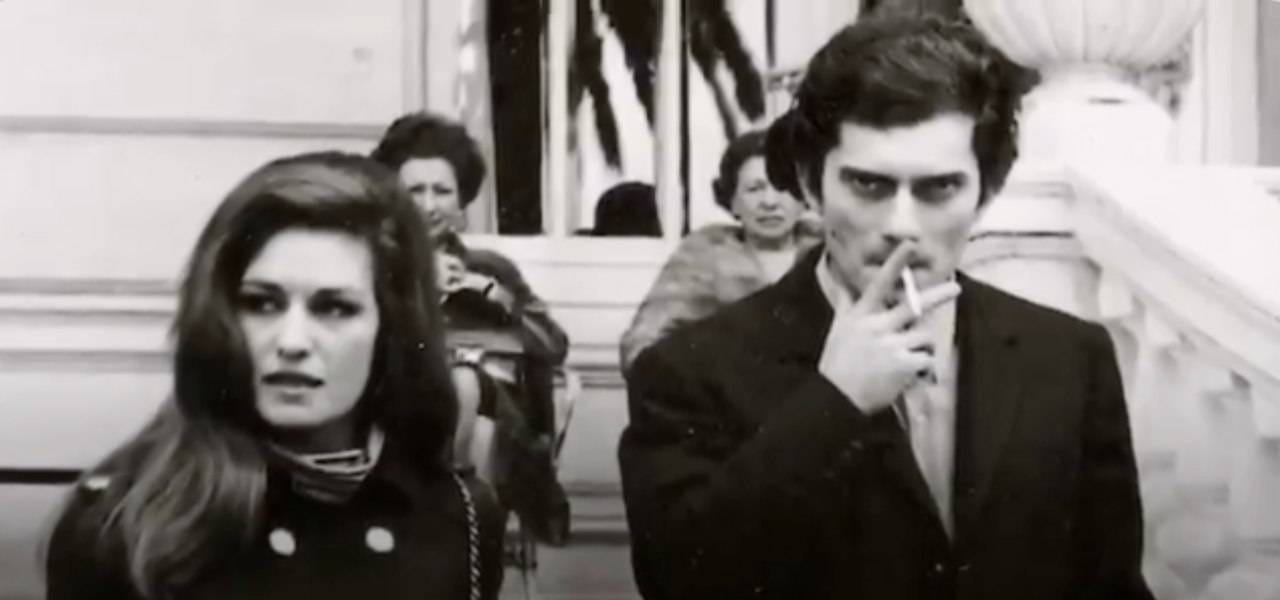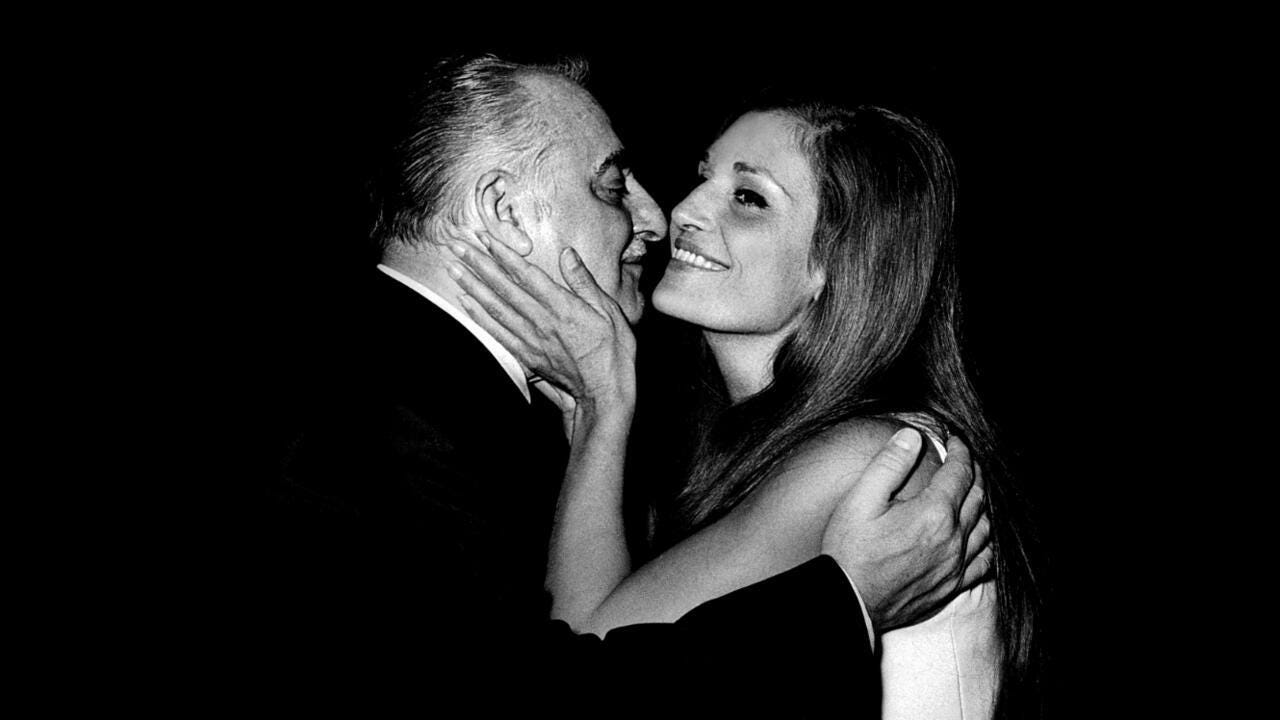Today would have been Dalida’s 90th birthday if she were still alive. With over 170 million records sold worldwide, Iolanda Gioliotti’s first hit “Bambino” spent a record-breaking 39 weeks at #1 in 1956. (Michael Jackson’s 37 weeks at #1 with “Thriller” is a close second.) The Diamond Disc (for 10 million records sold) was created for Dalida in 1981 (not Elton John, as commonly reported in English). She remains almost unheard of in the English-speaking world.
Although her voice has a limited range, it has been described as warm like the Mediterranean sun. She also had a knack for selecting the best, most innovative songs and creating amazing musical arrangements to showcase them.
Born and raised in Egypt to Catholic parents from Serrastretta, Calabria (Italy), a town founded by Spanish Jews fleeing the Inquisition, Dalida married a Frenchman and lived most of her life in Paris. She sang in 11 languages including Arabic and Hebrew. Amazingly, each community proudly claims her as one of their own.
Since the days of Marc Anthony and Cleopatra, there has been a vibrant Italian community in Egypt. Dalida’s father, concertmaster of the Cairo Opera, was arrested by the Allies in 1940 for simply being a working-age Italian male (due to fears of Mussolini), an injustice perpetrated by the Nazis in nations they conquered too. He was held in Fayed concentration camp near Cairo and did forced labor for the duration of the war. Photographs of the camp suggest medical experiments were run on the men, and indeed her father returned an utterly broken man, unable to stand noise or control his hair-trigger temper, even though he had previous been a kind fun-loving person. His physical condition went far beyond PTSD, and he died of a brain aneurysm in 1945 shortly after returning.
The experience affected Dalida profoundly and perhaps was why she repeatedly refused to enter the US market. Her only performances in the English-speaking world were NYC in 1978, NYC and LA in 1984, and London and LA in 1986.
Cultural & Gay Icon
A 1988 poll run by Le Monde newspaper identified Dalida as having the second largest impact on French culture after Charles De Gaulle. When asked to be the face of Marianne, the female symbol of French Revolution stamped on the money and official documents, she refused.
When post-WWII research found that a curious trait Nazis shared was angry sexual repression, war-torn countries decided to loosen sexual morés. The music of Dalida was instrumental in helping achieve this goal.
But in retrospect more thought must to go into how civilization can foster heart-centered edifying love (typified by the Beatles’ summer of 1967 hit “I Wanna Hold Your Hand”), as opposed to destructive predatory thrill-seeking (exemplified by the Doors’ summer of 1967 hit “C’mon Baby, Light My Fire”), the two very different ways to approach relationships.
Dalida became a gay icon in France with the groundbreaking 1973 song “Il Venait D’Avoir 18 Ans” (He Had Just Turned 18). This is the first song gays the world over connected with, spurring something of a movement.
The song resulted from a real love affair she had in December 1967 with a 22-year-old Italian student whose baby she decided to abort, leaving her infertile. He seems to have been her most compatible partner, but she would not consider staying with him for fear of what her mother would say.
In the 1980s, Dalida candidly talked about her life, her spirituality, God’s love, and that to her, homosexuality should be completely accepted; audiences would go wild with applause.
In 1983, at age 50 Dalida performed the bossa nova “Paroles, Paroles” (Words, Words) with several different singers including on French TV with 18-year-old Ginni Gallan, clad in tuxedos, putting a new twist on the popular song. (The 1973 hit was originally recorded with French film star Alain Delon.) The extraordinary performance of the love song was overwhelmingly well received.
But the commotion seems to have had negative personal consequences for both of them, who apparently never met again, as if determined to show the song was only fiction. Dalida developed serious eye problems and needed the same surgeries she had had as an infant, and Ginni Gallan, too intelligent not to see what working in the mafia-dominated music industry meant, quit singing altogether that year.
A Hidden Vengeful Hand?
Dalida’s life suddenly took a tragic turn in 1967 when she and her brother Bruno made the fateful decision to not renew their 10-year contract with the almighty Barclay Records, but to distribute her music through their own company, Orlando Productions.
A month later, Mafia involvement was immediately suspected in the sudden “suicide” of her fiancé, Luigi Tenco at a luxury hotel in San Remo, Italy. Dalida found the body and was never the same again according to her brother. One month later, she nearly succeeded in committing suicide and was hospitalized for 4 months. (In 2005, one of the detectives on the case confirmed on an Italian TV talk show that the detectives were ordered by the Mafia to not investigate the Luigi Tenco case. Two weeks later, the detective was killed outside his apartment; footage of him discussing the case is no longer online. In 2006, Tenco’s body was exhumed and the case was again ruled a suicide.)
Before 1967, Dalida's career was run by the notorious bluebeard record label owner Eddie Barclay (who married 9 times, his name was originally Ruault); producer, radio station owner and gambling addict Lucien Morisse (who briefly married Dalida, his name was originally Trzesmienski); and venue owner, producer and apparent mafioso Bruno Coquatrix (an unusual name found in Israel and France that means cockatrice or wyvern, a cruel insatiable winged 2-legged dragon that can kill with a glance and happens to be the shape of the landmass of North America with Canada as the wings and Florida and Baja California as two skinny legs).
Mr. Coquatrix was a frequent presence at Dalida’s Sunday parties at her house. He also managed Edith Piaf, who endured eerily similar tragedies. Hidden cameras in Dalida’s house seem to have provided footage of her sleeping in her bed and brushing her hair in the bathroom. In 2010, a street in Paris was named for him, just as New York City renamed a street was named Lou Walters Way in 2006 after a similar Jewish mafia figure, venue owner and father of Barbara Walters.
The 2021 James Bond film “No Time to Die” features Dalida’s 1968 hit song “Dans la Ville Endormie” (In the Sleeping City) in the opening scene. One of the trailers for the film features the tombstone of Vesper Lynd, James Bond’s true love, while Bond is told, “...did you think it was coincidence all the women in your life ended up dead?”
A 2017 BBC World Service story on Dalida confirms “there was something quite tragic going on,” then the Godfather theme (that Dalida also recorded in French) cues up, “Parle Plus Bas” (Speak Softly), subtly letting us know the exact nature of the problem.
In her later years, Dalida started singing beautiful heart sick songs like “Je Suis Malade” (I am Sick) by Serge Lama and “Mourir sur Scene” (To Die Onstage), as she always became one with songs she performed, it seems to have pushed her deeper into depression.
The night she took her own life, May 2-3, 1987, she told everyone she was looking forward to going to the theater with Michel, but he stood her up, raising the question of whether she was finally driven to commit suicide.
In 1969, Dalida went to India to study yoga and meditation. She had decided to give up singing to pursue spiritual growth full time. Her guru convinced her not to because singing was her God-given purpose on earth and that it expanded spiritual enlightenment for her as well as for the audience.
But the legend continues. In 2021, Dalida was presented another Diamond Disc decades after her death! In 2011, her song “Helwa Ya Baladi” became the informal anthem of the Arabic Spring in Tarir Square. Updated versions of “Paroles, Paroles” remain very popular in France.
The 2017 biopic “Dalida” is now online: https://tubitv.com/movies/517853/dalida
Go to “Settings” and Subtitles to automatically generate and translate subtitles into English:
Pedro Almodóvar's 'The Last Dream'
"The Last Dream" by Pedro Almodóvar (translated by Frank Wynne) is a collection of 12 short stories, including eight works of fiction, that were written over a span of 55 years.








